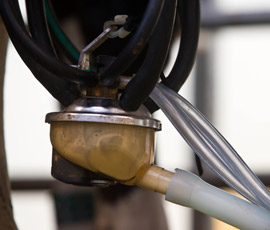Keep us out of milk price debate, says DairyCo

DairyCo has warned farmers and processors that its benchmark statistics should be kept out of any debate over farmgate milk prices.
It follows criticism by milk producers that production costs contained in the levy body’s latest MilkBench+ report are too low and exclude farm management time.
David Handley, chairman of Farmers For Action, which is campaigning for better milk prices, said costings for any other business sector would include management time.
Describing the MilkBench+ report as a backward step, Mr Handley said: “It is going to give the illusion that this industry is in a good place and it is in far from a good place.”
And dairy industry commentator Ian Potter said excluding any value for a farmers business management input from the report was curious.
“In fact, the report only includes a cost for the farmer’s manual labour input which at £8.90/hour for a West Midlands dairy farmer is hardly generous or realistic,” said Mr Potter.
This equated to less than £18,000 per year – well below a herdsman’s rate.
DairyCo head of production economics Mark Topliff said the Milkbench+ tool was designed to measure the cost and performance efficiency of milk production.
“It is not an attempt to produce a cost of production for farmers or processors to use in a debate about milk pricing.”
Mark Topliff, DairyCo head of production
In doing so, it aimed to help farmers identify areas for development and hence improve their performance, said Mr Topliff.
“It is not an attempt to produce a cost of production for farmers or processors to use in a debate about milk pricing,” he told Farmers Weekly.
“It uses imputed values to allow a meaningful comparison between farms which may have all employed labour on the one hand and only family labour on the other.
“This means the pence per litre cost will differs from the actual cost of production the farmer feels.
Where there was an actual paid labour cost, this was used in the system. But where no labour cost was available, such as in cases of unpaid family labour, imputed values were used.
“Without imputed values it would not be possible to benchmark effectively, nor would it be possible for farmers to compare themselves meaningfully with their peers,” said Mr Topliff.
“With regard to business management costs, these are excluded so that businesses can be compared on an equal footing.”
Milkbench+ was based on measurable data and the variety of different business management structures meant management costs between farms were not comparable, said Mr Topliff.
One farm, for example, may have an employed herd manager while a similar farm might be managed by a family, he explained.
“Milkbench+ is designed to measure production efficiency which means that the quality of management will be reflected in how efficiently the farm is run,” said Mr Topliff.
“Efficient farms will have a higher net margin and less efficient a lower or negative net margin.”
VIDEO: Dairy farmers urged to unite for price battle
